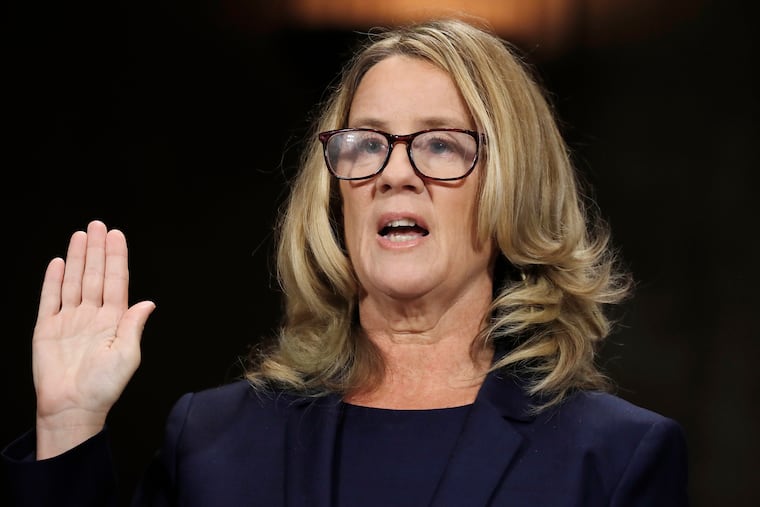
On Thursday, the nation watched as Dr. Christine Blasey Ford shared with the Senate Judiciary Committee the disturbing details of a sexual assault she experienced as a 15-year-old: the terror she felt in that moment, the horror of the physical assault and the psychological trauma of believing she might die. We heard her describe, in vivid detail, how two boys, under the influence of alcohol, pushed her into a bedroom, locked the door, and turned up the music; how one of the boys pinned her to the bed and covered her mouth to muffle her screams; how she escaped and heard them drunkenly "pinballing" down the staircase; how her clearest memory from the assault was the boys' laughter.
We watched as she identified her attacker as Supreme Court nominee Brett Kavanaugh with "100 percent" certainty. We heard her sworn testimony that was not only credible and persuasive but also undeniably brave.
>> READ MORE: 11 cartoons that show America's complicated feelings about Brett Kavanaugh and Christine Blasey Ford | Opinion
I believe Dr. Ford.
But as I listened to her recount her trauma in gut-wrenching detail, I was sadly aware that Dr. Ford's story is one all too familiar to the millions of survivors of sexual violence in this country.
Seven years ago, I began working alongside advocates, experts, and survivors of sexual assault to explore how we as a nation could do more to prevent these assaults, specifically on college campuses. I heard story after story of anguish and horror, revealing how pervasive and insidious sexual violence is in our culture.
That same year, I drafted legislation that eventually became the Campus Sexual Violence Elimination Act, or Campus SaVE Act, which was enacted into law as a part of the Violence Against Women Reauthorization Act of 2013.
>> READ MORE: Do Cosby, Kavanaugh cases make young women feel more vulnerable? | Commentary
In the two years I spent working on this bill, and in the time since, I have learned many things from survivors who have shared their stories with me. The first is that they fear what will happen when they speak up. As we have seen, time and time again, when individuals say they have been sexually assaulted, they are often met with ridicule, hostility, or even downright threats of violence. They are consistently subjected to invasive, blame-shifting questions like "what were you wearing?" and "how much did you have to drink?" instead of being met with compassion.
The second thing I have learned is that, as a result of this fear, they don't make the decision to come forward lightly. Many of them decide not to tell anyone, because they are afraid, because they are ashamed, because they think it will be easier if they just try to forget. Victims are often manipulated by their abusers to think that no one will believe them, that it was their fault, or that the abuser will continue to hurt them if they speak out. The victims who do immediately report that they have been sexually assaulted are subject to invasive personal exams, known as a "rape kit," to try to collect evidence of the assault. They may be asked to recount their assault multiple times to different people. This can be traumatic in and of itself.
>> READ MORE: The Kavanaugh hearings were another rumbling of the volcano. And the left can't hear it. | Opinion
And the third thing I have learned is that survivors need support regardless of whether they pursue legal or disciplinary action, because being the victim of a sexual assault is a harrowing experience that changes you forever. That is why the Campus SaVE Act makes it clear that a survivor who comes forward is entitled to services regardless of whether or not they are also seeking legal or disciplinary action. This is why we need to strengthen and fund the Child Abuse Prevention and Treatment Act and the Child Advocacy Centers. This is why we need to reauthorize the Violence Against Women Act.
But most important, this is why we need to listen to, and trust, survivors. I believe Dr. Christine Blasey Ford when she says she was the victim of sexual assault. I believe the other victims of sexual abuse and assault who have contacted me and my office in recent days. I hear you; I believe you; I am listening to you.
Bob Casey is Pennsylvania's Democratic senator.